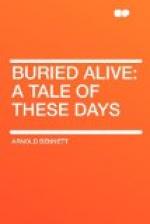Existence at Putney seemed to Priam Farll to approach the Utopian. It seemed to breathe of romance—the romance of common sense and kindliness and simplicity. It made his own existence to that day appear a futile and unhappy striving after the impossible. Art? What was it? What did it lead to? He was sick of art, and sick of all the forms of activity to which he had hitherto been accustomed and which he had mistaken for life itself.
One little home, fixed and stable, rendered foolish the whole concourse of European hotels.
“I suppose you won’t be staying here long,” demanded Mrs. Challice.
“Oh no!” he said. “I shall decide something.”
“Shall you take another place?” she inquired.
“Another place?”
“Yes.” Her smile was excessively persuasive and inviting.
“I don’t know,” he said diffidently.
“You must have put a good bit by,” she said, still with the same smile. “Or perhaps you haven’t. Saving’s a matter of chance. That’s what I always do say. It just depends how you begin. It’s a habit. I’d never really blame anybody for not saving. And men——!” She seemed to wish to indicate that men were specially to be excused if they did not save.
She had a large mind: that was sure. She understood—things, and human nature in particular. She was not one of those creatures that a man meets with sometimes—creatures who are for ever on the watch to pounce, and who are incapable of making allowances for any male frailty—smooth, smiling creatures, with thin lips, hair a little scanty at the front, and a quietly omniscient ‘don’t-tell-me’ tone. Mrs. Alice Challice had a mouth as wide as her ideas, and a full underlip. She was a woman who, as it were, ran out to meet you when you started to cross the dangerous roadway which separates the two sexes. She comprehended because she wanted to comprehend. And when she could not comprehend she would deceive herself that she did: which amounts to the equivalent.
She was a living proof that in her sex social distinctions do not effectively count. Nothing counted where she was concerned, except a distinction far more profound than any social distinction—the historic distinction between Adam and Eve. She was balm to Priam Farll. She might have been equally balm to King David, Uriah the Hittite, Socrates, Rousseau, Lord Byron, Heine, or Charlie Peace. She would have understood them all. They would all have been ready to cushion themselves on her comfortableness. Was she a lady? Pish! She was a woman.
Her temperament drew Priam Farll like an electrified magnet. To wander about freely in that roomy sympathy of hers seemed to him to be the supreme reward of experience. It seemed like the good inn after the bleak high-road, the oasis after the sandstorm, shade after glare, the dressing after the wound, sleep after insomnia, surcease from unspeakable torture. He wanted, in a word, to tell her everything, because she would not demand any difficult explanations. She had given him an opening, in her mention of savings. In reply to her suggestion, “You must have put a good bit by,” he could casually answer:




